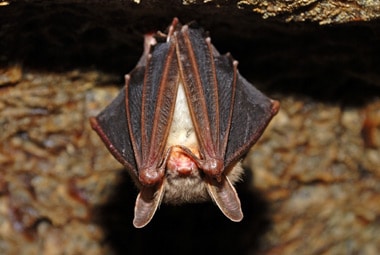As the sun sets in the evening, you may have seen bats swooping low in your yard. Whether or not you like bats doesn’t really matter- they are out there and as long as they stay out of your hair, hopefully, you won’t have to deal with them! But there are some pros and cons of having bats on your property. Here are some of the pros and cons of bats in your backyard.
The Pros of Having Bats:
- Bats are nature's insect control. They eat mosquitoes all night long, also binging on moths, wasps, beetles, gnats, midges, mayflies and other insects. The little brown bat is one of the most common bats in North America and these insectivores can catch up to 600 insects an hour!
- Guano, which is another name for bat droppings, can be beneficial for your garden! Guano is rich in nitrogen and is considered an excellent fertilizer. There are even some enzymes in bacteria in guano that scientists have found to be good when added to cleaning agents, including laundry soaps (we’ll leave that to the scientists to keep testing).
- Bats are pollinators. They move pollen grains from flower to flower, which helps to pollinate flowers and plants.
- Bats help distribute the seeds of many different kinds of plants, including bananas, mangoes, cashews, dates, avocados, peaches and figs, just to name a few.
The Cons of Having Bats:
- Bats may take up residence in your home to raise their young. When they do this, they become a problem on your property, causing damage to your structure and leaving bat droppings throughout your attic and on your home.
- Although not typical, bats can spread rabies. This disease can be dangerous for you and for your pets. They are not usually aggressive mammals but may bite if manhandled.
- Bat guano can spread histoplasmosis. This illness primarily affects the lungs; it is spread by breathing in a fungus that grows in accumulated guano.
- They can introduce other bugs into your home, like bat bugs.
Common Types of Bats
Common bats that people come into contact with include little brown bats and big brown bats. They are quite similar in appearance and behavior and as you can gather from their name, but big brown bats are the larger of the two. As mentioned before, bats are a great source of natural pest control to help control mosquito and other insect populations on your property. There is a lot of fear surrounding bats and their bites. Old myths of bats being related to vampires cause quite a bit of fear around these creatures. And while it is true that bats can bite and they can spread disease such as rabies, it does not mean that they are vampire-like creatures we should fear when outside. They will rarely attack a human unless provoked.
How to Inspect Your Home for Bats
To inspect your home thoroughly, pay attention to loose tiles, vents, chimneys, fascia boards, where soffits meet your roofline, and anywhere else there may be a hole. Bats can squeeze through the tiniest of spaces. Seal up all openings by using a caulking gun or by putting netting over vents and other similar openings.
Although bats can be useful, they are best when they stay away from your home and attic! If you have bats in your home, you don’t want to try to evict them on your own. There are laws about when you can evict bats, especially if they are roosting with their young. To get rid of bats and help prevent them from returning, contact your local pest control professionals. When it comes to bats and other wildlife animals, it is always best left to the pros!


